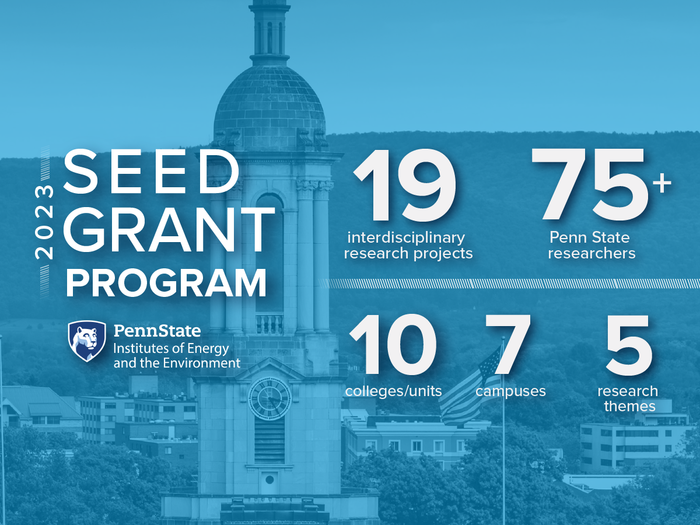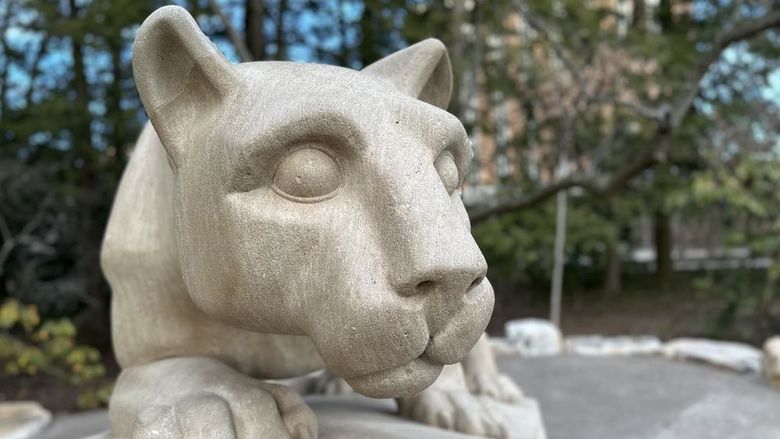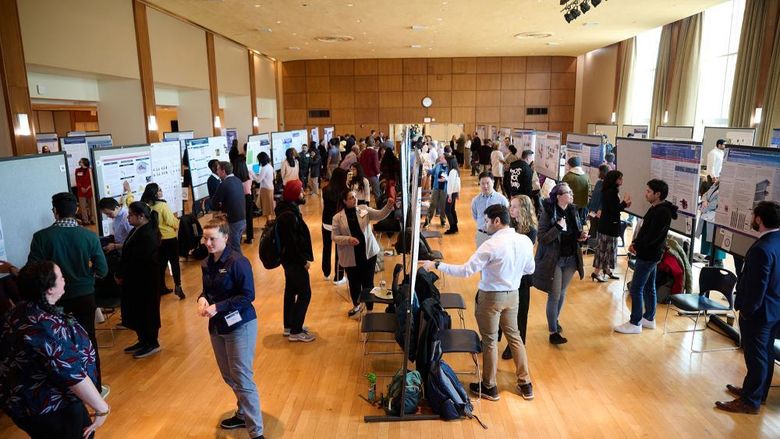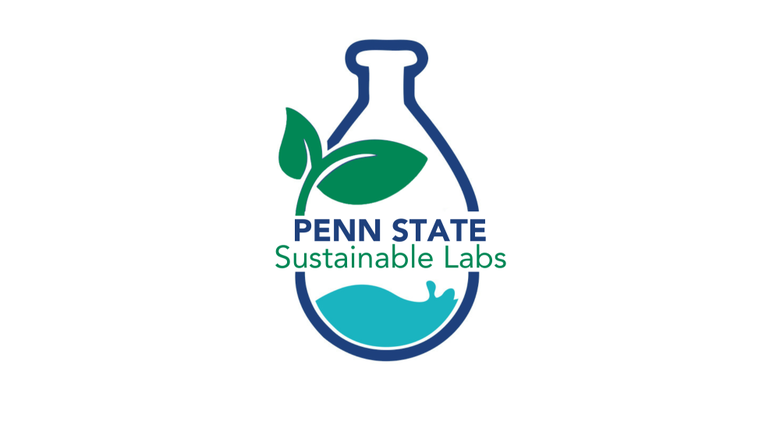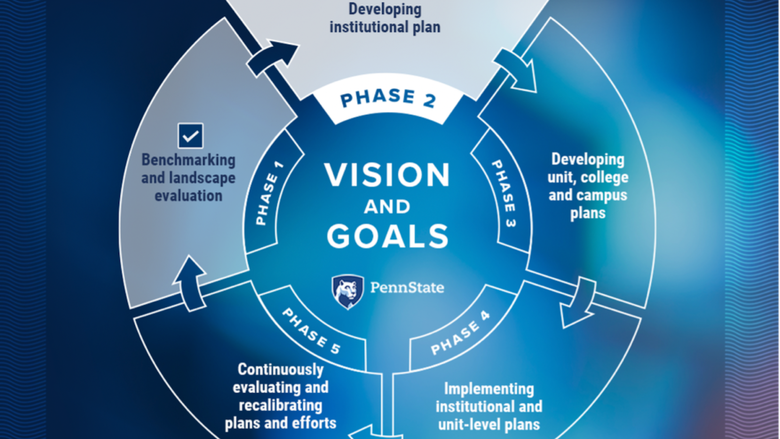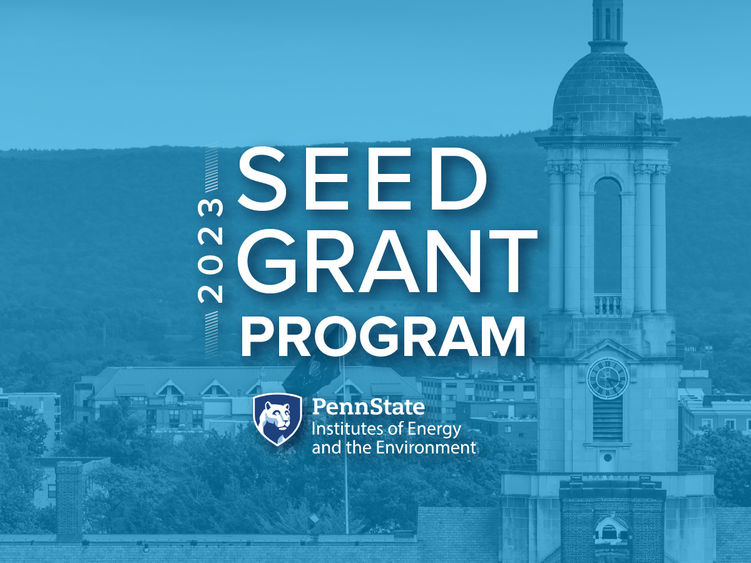
For ten years, the Institutes of Energy and the Environment has awarded funding to more than 400 researchers and 200 interdisciplinary projects across multiple Penn State colleges and campuses.
UNIVERSITY PARK, Pa. — Nineteen interdisciplinary research teams received funding through the Institutes of Energy and the Environment’s (IEE) Seed Grant Program for 2023. This includes more than 75 researchers who are affiliated with 10 colleges and research units across seven Penn State campuses.
“For 10 years, the IEE Seed Grant Program has made essential investments in interdisciplinary teams of researchers. These crucial funds allow teams to perform the foundational work and data collection necessary to acquire large external grants,” said Bruce Logan, IEE director and Evan Pugh University Professor and Kappe Professor of Environmental Engineering. “Additionally, the external funding that results from these seed grant projects continues to significantly exceed our investment.”
IEE’s Seed Grant Program fosters basic and applied research addressing five research themes: Climate and Ecosystem Change; Health and the Environment; Integrated Energy Systems; Urban Systems; and Water and Biogeochemical Cycles.
“In addition to the investment of funds, the IEE Seed Grant Program is an investment in people,” said Erica Smithwick, IEE associate director and distinguished professor of geography. “Each year, senior faculty work across disciplines with junior faculty, postdoctoral scholars and graduate students. This results in well-rounded and experienced researchers who will lead interdisciplinary teams of their own one day.”
The 2023 projects — along with their principal investigators, co-investigators and affiliated colleges/units— that were awarded seed grants are:
Climate and Ecosystem Change
-
“A Multi-Disciplinary Approach To Mitigating Climate Impacts Of Aviation Contrails” will study contrails and other emissions from aircraft to develop new technologies for more sustainable aviation as air travel’s impact on climate change is anticipated to increase. Sven Schmitz, College of Engineering; Guido Cervone, College of Earth and Mineral Sciences; Andrew Carleton, College of Earth and Mineral Sciences; Burcu Ozden, Penn State Abington; Masataka Okutsu, Penn State Abington.
-
“Constraining Olivine Carbonation Rates in Igneous Mafic Formations” will investigate the carbonation rates of mafic rocks as a function of temperature, pressure, mineralogy, and solution chemistry to develop more efficient methods for carbon capture and sequestration. Matthew Fantle, College of Earth and Mineral Sciences; Christopher Gorski, College of Engineering.
-
“CoRe at PSU – Growing Cold Regions Research Capabilities at Penn State University” will conduct experiments to quantify and understand small-scale erosive processes in thawing permafrost, which will help to develop resilient solutions to the challenges imposed by climate change in cold regions. Roberto Fernández, College of Engineering; Anastasia Piliouras, College of Earth and Mineral Sciences; Talley Fisher, the Huck Institutes of the Life Sciences; Daryl Branford, the Huck Institutes of the Life Sciences; Liz Hajek, College of Earth and Mineral Sciences; Xiaofeng Liu, College of Engineering.
-
“Piloting a Global Youth Storytelling and Research Lab” will launch The Global Youth Storytelling and Research Lab, which will be a transnational research ecosystem that will engage youth leaders in climate and environmental justice research. Brian King, College of Earth and Mineral Sciences; Mark Ortiz, Presidential Postdoctoral Fellow.
-
“Understanding Compound Stressors and Stakeholder Tradeoffs of Agricultural Adaptation to Climate Change in the Colorado River” will develop new capabilities in synthetic weather generation and improved agricultural modeling to understand how climate change and agricultural adaptation will affect water availability in the Upper Colorado River Basin. Antonia Hadjimichael, College of Earth and Mineral Sciences; Cibin Raj, College of Agricultural Sciences; Meetpal Kukal, College of Agricultural Sciences; Alexander Thames, College of Earth and Mineral Sciences.
-
“Understanding the Material Impacts of Restoration on Landscapes and People in Africa: Learning Cases from Malawi” will develop an integrated methodology to measure the socio-environmental outcomes of forest landscape restoration in Malawi, with the goal of informing policy and practice on restoration monitoring. Ida Djenontin, College of Earth and Mineral Sciences; Tong Qiu, College of Agricultural Sciences; Erica Smithwick, College of Earth and Mineral Sciences; Judith Kamoto, Bunda College of Lilongwe University; Tangu Temeo, International Union for Conservation of Nature and Natural Resources; Clement Adjorlolo, African Union Development Agency.
“For 10 years, the IEE Seed Grant Program has made essential investments in interdisciplinary teams of researchers. These crucial funds allow teams to perform the foundational work and data collection necessary to acquire large external grants. Additionally, the external funding that results from these seed grant projects continues to significantly exceed our investment.”—Bruce Logan , director, Institutes of Energy and the Environment
Health and the Environment
-
“Assessing the Energy Impacts of Electric Lighting Using Alternative Spectral Sensitivities“ will develop new lighting efficacy metrics based on human visual response to light to improve the design and evaluation of lighting systems. Dorukalp Durmus, College of Engineering; Bradley Wyble, College of the Liberal Arts.
-
“Developing Water Treatment Technologies for PFAS Removal in Disadvantaged Communities” will evaluate the ability of biochar, moringa seeds, and low-energy membranes to remove PFAS chemicals from drinking water and will provide information to homeowners and Extension partners about the effectiveness and cost of these treatment options. Heather Preisendanz, College of Agricultural Sciences; Enrique Gomez, College of Engineering; Juliana Vasco-Correa, College of Agricultural Sciences; Stephanie Velegol, College of Engineering.
-
“Exploring the Impacts of Flooding Events on Substance Use in Rural Appalachia” will investigate the impact of flooding events on substance use outcomes and substance use service provision in rural Appalachia, where flooding events are becoming more common due to climate change. Kristina Brant, College of Agricultural Sciences; Zhen Lei, College of Earth and Mineral Sciences; Sarah Kawasaki, College of Medicine.
-
“Fungal Upcycling of Waste Plastic Film” will investigate the potential of fungal degradation to break down plastic into biologically tractable carbon and will evaluate the impact of this technology at scale. Gamini Mendis, Penn State Behrend; Luciana Aronne, Penn State Behrend; Josephine Wee, College of Agricultural Sciences
“In addition to the investment of funds, the IEE Seed Grant Program is an investment in people. Each year, senior faculty work across disciplines with junior faculty, postdoctoral scholars and graduate students. This results in well-rounded and experienced researchers who will lead interdisciplinary teams of their own one day.”—Erica Smithwick , associate director, Institutes of Energy and the Environment
Integrated Energy Systems
-
“Binderless Low-Temperature Densification Process for Production of Graphite Based Bipolar Plates for Fuel Cells” will develop a low-temperature, environmentally friendly, and cost-effective process to produce graphite-based bipolar plates for fuel cells. Ramakrishnan Rajagopalan, Penn State DuBois; William Yourey, Penn State Hazleton; Gamini Mendis, Penn State Behrend.
-
“Biorenewable Multifunctional Composites for Structural/Dielectric Applications” will develop a bio-based dielectric composite from epoxidized soybean oil, epoxy resin, and ceramic nanofillers for potential applications in dielectric storage energy devices. Samy Madbouly, Penn State Behrend; Ralph Colby, College of Earth and Mineral Sciences.
-
“Impact of CO2 Mineralization on the Evolution of Storage-Rock Microstructure” will investigate the fundamental link between mineral precipitation and dissolution in porous microstructures and develop a model to predict site-specific assessment and optimization of CO2 injectivity, leakage potential, and ultimate storage or mineralization capacity of underground formations. Yashar Mehmani, College of Earth and Mineral Sciences; Anne Menefee, College of Earth and Mineral Sciences.
-
“Next Generation Floating Offshore Wind Turbine” will make floating offshore wind turbines (FOWTs) commercially viable in the near term by creating a turbine with lower overall weight, reduced mechanical loads, and lower buoyancy requirements than existing FOWT designs. Mark Miller, College of Engineering; Sven Schmitz, College of Engineering; Mike Yukish, Applied Research Lab; Simon Miller, Applied Research Lab.
-
“Rational Design of Bio-inspired and Earth-abundant Catalysts for Carbon Dioxide Reduction into Fuels and Fine Chemicals” will use computational techniques to design and test earth-abundant iron-based sulfide catalysts for CO2 conversion into fuels and fine chemicals. Nelson Yaw Dzade, College of Earth and Mineral Sciences; Ismaila Dabo, College of Earth and Mineral Sciences; Derek Hall, College of Earth and Mineral Sciences; Venkatraman Gopalan, College of Earth and Mineral Sciences; Raymond Schaak, Eberly College of Science; Jon-Paul Maria, College of Earth and Mineral Sciences.
-
“Sustainable and Just Pathways to Agrivoltaics in Pennsylvania” will investigate the social, economic and environmental impacts of agrivoltaics in Pennsylvania, with the goal of developing best practices for the co-location of solar panels and agriculture. Stephanie Buechler, College of Agricultural Sciences; Estelle Couradeau, College of Agricultural Sciences; Trevor Birkenholtz, College of Earth and Mineral Sciences; Lauren McPhillips, College of Engineering; Kaitlyn Spangler, College of Earth and Mineral Sciences; Erica Smithwick, College of Earth and Mineral Sciences.
-
“Understanding the Scope, Drivers, and Energy Justice Implications of Solar Adoption in the United States Wastewater Sector” will develop a database of wastewater treatment plants with solar adoption data and a statistical model to explore potential drivers of solar adoption, with the goal of understanding the energy justice implications of renewable energy adoption in the wastewater sector. Christine Kirchhoff, College of Engineering; Kimberly Van Meter, College of Earth and Mineral Sciences; Hannah Wiseman, Penn State Law.
Urban Systems
-
“Additive Manufacturing of Elastocaloric Cooling Shape Memory Alloy: From Materials and Device Fabrication to System-level Analysis for High-Performance Buildings” will develop a more efficient and sustainable cooling solution towards future urban high-performance building systems using shape memory alloys fabricated by additive manufacturing. Wenjie Li, College of Earth and Mineral Sciences; Herschel Pangborn, College of Engineering; Na Liu, College of Earth and Mineral Sciences; Allison Beese, College of Earth and Mineral Sciences; Bed Poudel, College of Earth and Mineral Sciences; Edward Reutzel, Applied Research Laboratory; Zi-Kui Liu, College of Earth and Mineral Sciences.
Water and Biogeochemical Cycles
-
“Community Science-Driven Data Collection of Pennsylvania Urban Stormwater Control Measures Augmented by Machine Learning” will create a comprehensive inventory of existing urban stormwater control measures through community volunteer participation and machine learning to improve urban stormwater management. Cibin Raj, College of Agricultural Sciences; Jennifer Fetter, Penn State Extension; Shirley Clark, Penn State Harrisburg; Lauren McPhillips, College of Engineering; Hong Wu, College of Arts and Architecture; Rohith Anthanahalli Nanjegowda, College of Agricultural Sciences; Dawn Stelts, Native Habitat Developers LLC.
The Institutes of Energy and the Environment connects and supports interdisciplinary teams of researchers that are solving some of the world’s most difficult energy and environmental challenges. For more information about the seed grant program or the Institutes of Energy and the Environment, visit iee.psu.edu.
